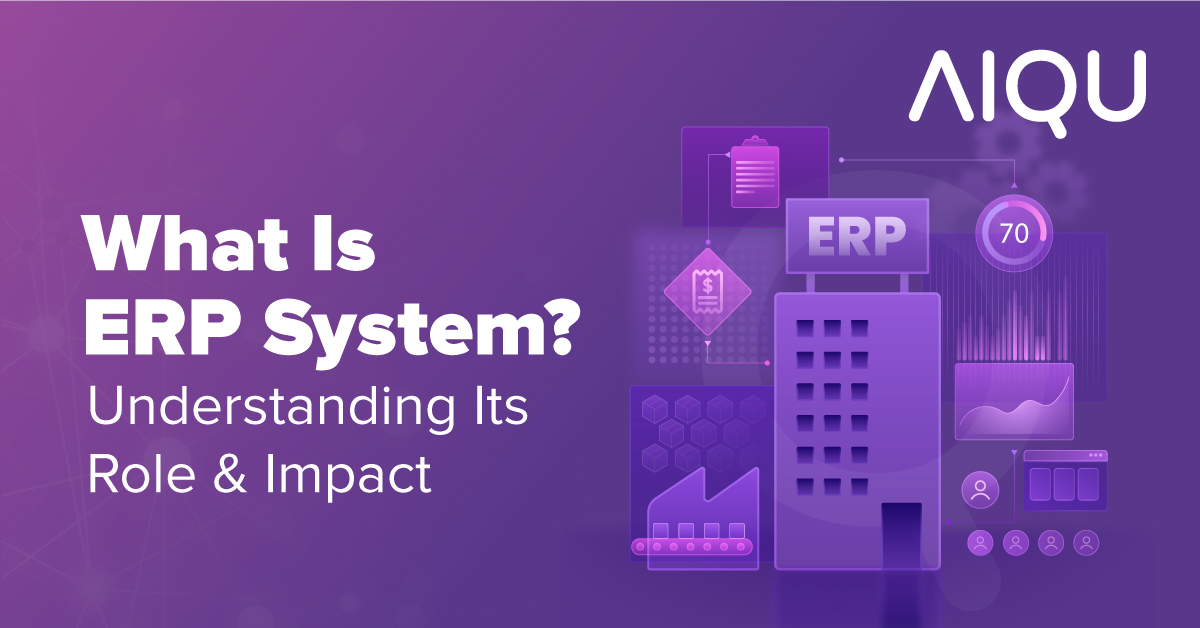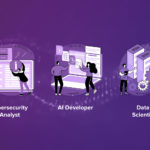What Is ERP System? Understanding Its Role & Impact

Author Name: Daniyal Chishti
The digital revolution has shifted business operations in ways we couldn’t have imagined a few decades ago. One such pivotal development is the advent of Enterprise Resource Planning (ERP) systems, which have drastically transformed the management of business resources. Understanding ERP systems is no longer a choice, but an essentiality for businesses and tech professionals. Let’s unravel the basics of ERP systems and how they work in today’s world…
What Is An ERP System?
An ERP system is a powerful software solution that integrates and automates core business processes such as sales, purchasing, accounting, Human Resource management, customer support, CRM, and supply chain operations. It offers a unified platform that enhances data accessibility and workflow, driving efficiency and decision-making accuracy.
An ERP system can be likened to the central nervous system of an organization. Much like how the nervous system collects, processes, and distributes information to various parts of the body, an ERP system gathers data from different business units, processes it, and makes it accessible across the organization. This seamless integration and data flow enables smooth transactions and production, thus significantly increasing the organization’s overall efficiency.
Components Of An ERP System
A comprehensive ERP system is composed of several modules, each addressing different functional areas of the business. These components may include:
- Financial Management – For tracking revenues, costs, and profitability.
- Supply Chain Management – For managing inventory, procurement, and order processing.
- Human Resource Management (HRM) – For personnel tracking, payroll, and benefits.
- Customer Relationship Management (CRM) – For customer service and sales tracking.
- Project Management – For project planning, resource allocation, and progress tracking.
Each module operates independently, yet they are interconnected to ensure seamless and efficient business processes.
The Importance Of ERP Systems In Businesses Today
The value of ERP systems in today’s business landscape is unparalleled. By automating business processes and enhancing data accessibility and consistency, ERP systems drive operational efficiency and strategic decision-making. At the operational level, an ERP system centralizes data from various departments into a single, unified database. This centralized data management facilitates quicker information access and decision-making.
For instance, when a customer order is received, the ERP system automatically checks product availability, schedules delivery, updates financial records, and adjusts inventory, all without requiring human intervention. This not only accelerates business operations but also minimizes the risk of errors and inconsistencies.
How ERP Systems Improve Business Efficiency
ERP systems foster business efficiency in several ways:
- Improved Accuracy: ERP systems improve accuracy by automating data entry and avoiding manual errors. This leads to more efficient planning and better cost control.
- Automation Of Business Tasks: ERP systems automate various business tasks and processes, reducing repetitive tasks and allowing more time for other operations. This leads to increased efficiency in numerous departments.
- Enhanced Project Management: ERP systems provide real-time data related to a project, such as allocating resources, monitoring costs, tracking performance, and in-depth reporting. This helps businesses manage projects more efficiently.
- Centralized Data: ERP systems centralize business data from different departments, providing customizable reporting and a better view of organizational performance. This allows collaboration between departments and improves decision-making capabilities.
Real-Life Examples Of Businesses Benefiting From ERP Systems
Numerous enterprises across various industries have harnessed the transformative power of ERP systems. For instance, Cadbury, a renowned confectionery company, witnessed remarkable improvements in their warehouse management and branch operations following the introduction of an ERP system. It addressed existing challenges, enhanced efficiency, and facilitated rapid expansion.
Another inspiring success story is that of LG Electronics. The company faced significant hurdles in consolidating HR data for worldwide reporting. The process was complex, time-consuming, and expensive due to different HR programs used by its subsidiaries.
To combat these challenges, LG Electronics switched to a single, integrated ERP system that drastically simplified HR administration and bolstered the company’s ability to attract and retain top talent. The benefits accrued from the ERP implementation included increased transparency in the hiring and employee evaluation process, and the flexibility for regions to implement changes locally due to the centralized HR management system. It also boosted HR management by providing senior managers with real-time access to information.
The Value Of ERP Knowledge & Growing Demand For ERP Professionals
ERP systems are becoming an integral part of business infrastructures, thereby escalating the demand for ERP professionals. These individuals are crucial to managing and maintaining the ERP system, interpreting the data it produces, and troubleshooting any issues. ERP professionals are sought after not only in the tech industry but also in sectors like manufacturing, retail, healthcare, and more.
For tech job seekers, knowledge of ERP systems can significantly enhance their employability. Since ERP systems consolidate and manage a myriad of business functions, having a solid understanding of ERP can give tech professionals an integrated view of business operations.
Working effectively with ERP systems requires a unique blend of skills. In addition to a strong understanding of business processes and analytical thinking, problem-solving abilities and excellent communication skills are crucial. An individual proficient in these skills and equipped with ERP knowledge can significantly enhance a company’s efficiency and productivity, making them a valuable asset.
How ERP Knowledge Gives Candidates An Edge In The Tech Job Market
With the tech job market becoming increasingly competitive, possessing ERP skills can be a differentiating factor for candidates.
High Demand For ERP Professionals: The tech job market is experiencing unparalleled growth, and there is a high demand for specialized professionals such as ERP, CRM, and BIM specialists. This presents opportunities for job seekers with ERP knowledge and expertise.
Soft & Technical Skills: In a fiercely competitive job market, having ERP skills can set candidates apart from their peers. Tech professionals who understand how to leverage ERP systems are not just limited to traditional IT roles; they’re also ideal for managerial positions that require a comprehensive understanding of business operations. This cross-functional expertise can make them indispensable to companies, thereby giving them a competitive edge in the tech job market.
Career Growth Opportunities: ERP knowledge can lead to career growth opportunities, such as becoming an ERP analyst. This can lead to higher salaries and better job prospects.
Embrace The Future With AIQU
Mastering ERP systems can catapult both businesses and tech professionals into a new echelon of success. With their integral role in modern operations and the tech job market, ERP systems open a plethora of opportunities.
Yet, aligning the right skills with the right opportunities is vital. This is where we come into play. AIQU is committed to linking talented professionals with innovative companies across the MENA region, we’re here to help your ERP expertise find the perfect home.
If you’re ready to maximize your career opportunities in ERP, submit your CV and take the next step with AIQU.
If you’re an organization looking to implement ERP systems but lack the right talent, get in touch with our tech recruitment experts now. Let’s harness the power of ERP knowledge together.





